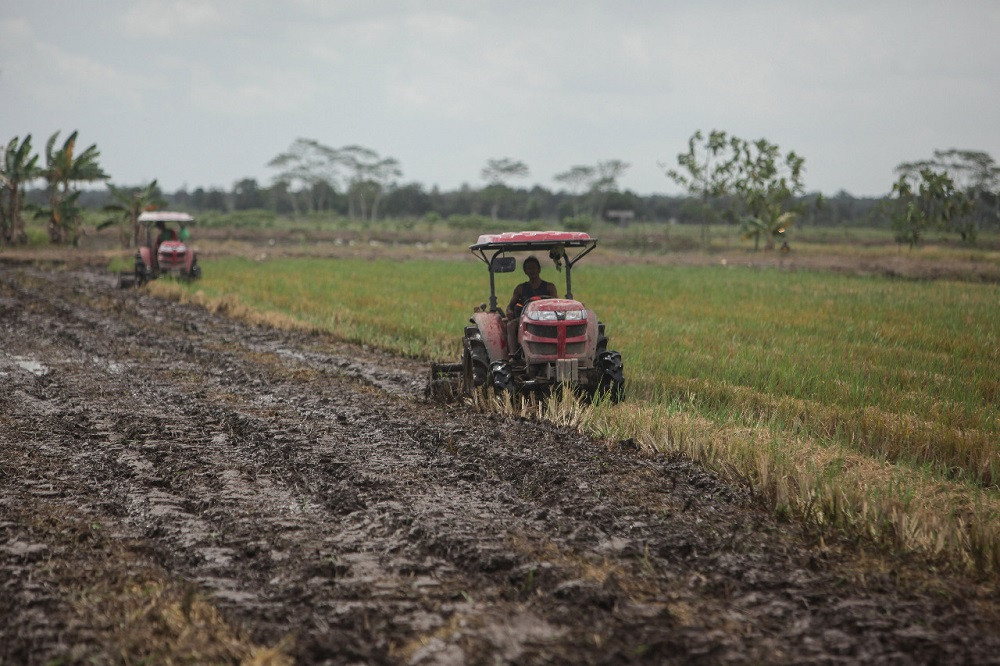Popular Reads
Top Results
Can't find what you're looking for?
View all search resultsPopular Reads
Top Results
Can't find what you're looking for?
View all search resultsMinistry dismisses concerns over deforestation for food estates
Change text size
Gift Premium Articles
to Anyone
T
he Environment and Forestry Ministry has dismissed concerns from environmentalists over the risks of massive deforestation after the ministry passed a regulation allowing forests to be converted into farmland to support the government’s food estate program.
The ministerial regulation, signed by minister Siti Nurbaya Bakar on Oct. 26, stipulates that both production forests and protected forests could be converted into so-called Forest Zones for Food Security (KHKP).
Ministry spokesperson Nunu Anugrah said the regulation was issued to support national food security, which he dubbed an urgent issue to address amid the global coronavirus pandemic.
"National food security is an urgent matter [...]; every country is currently increasing its strength to maintain its food availability so they will not depend on other countries. This issue is very relevant amid the COVID-19 pandemic," Nunu said in a statement on Monday.
The food estates are considered essential as the coronavirus crisis has aggravated Indonesia's food security issues.
President Joko "Jokowi" Widodo announced in late April that key commodities, such as garlic, sugar, chili and chicken eggs, were in short supply in more than 20 provinces, while rice -- a staple food for Indonesians -- was lacking in seven provinces.
The projects were also aimed at overcoming food distribution issues across the archipelago, land use change, especially in Java, and the country’s population growth.
The World Food Program’s (WFP) Indonesia office estimated that the country experienced a 13.2 percent year-on-year decline in rice production to 16.1 million tons in the first half of 2020.
Read also: Food estate program in protected forests may lead to 'massive deforestation' in Indonesia
Sigit Hardwinarto, the ministry's director general for forest planning and environment order, said that production forests would need to undergo a strategic environmental assessment (KLHS) before they could be converted into farmland.
"The parties who issue a forest conversion permit must also submit an environmental management scheme and environmental monitoring scheme [UKL-UPL]," Sigit said on Monday.
Sigit also refuted statements from the Indonesian Forum for the Environment (Walhi), which had argued that the new ministerial regulation would increase the risk of land conflicts between big corporations and local farmers, since it did not include agricultural schemes for the latter.
"The farmland would be redistributed to local residents in accordance with current law," Sigit claimed.
Only ministers, governors, heads of state bodies, regents and mayors could request a permit from the Environment and Forestry Minister to convert a forest into KHKP, Nunu added. "Private [entities] cannot apply for such permits."
According to the ministry, forest zones that could be converted to support the food estate program are areas that no longer entirely function as protected forest, such as those that have been illegally converted to farmland or have deteriorating conditions due to environmental degradation and deforestation.
Trees in the KHKP areas would not be cut down but rather be integrated with crops using agroforestry systems, such as silvopasture, which pertains to the integration of trees and grazing livestock operations, and silvofishery, which combines aquaculture conservation and land utilization, Sigit said.
"In this case, the food estate program would also help rehabilitate and restore [damaged] protected forest zones," he said.
Jokowi's administration has announced a plan to develop around 164,600 hectares of land in Central Kalimantan and 61,000 ha in North Sumatra for food estates. The land would be developed for crops like rice, potatoes, shallots and garlic.
Nunu said the ministry had set strict requirements for the forest conversion to ensure food estate sustainability and to protect the environment.










